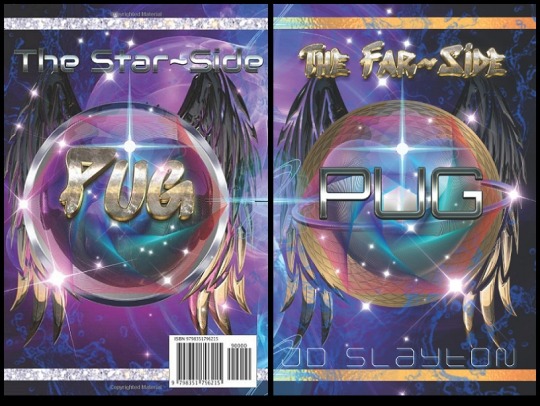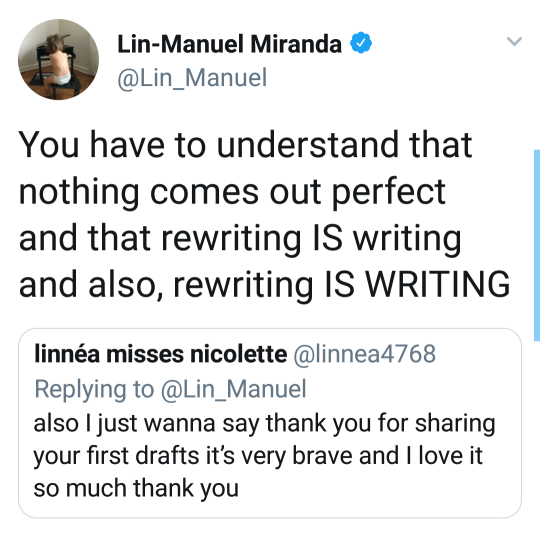Text
102 notes
·
View notes
Text

Pug Play on YouTube! @ jdslaytontheauthorofpug 💎
Take flight with Pug here! ✨💜✨

Get Pug Gear here! 💎💜🔥🏹✨









22 notes
·
View notes
Text
My new book is available now! The cosmic launch is on!
Get your first copy today!!! ✨
Stay pUg~dated @ jdslayton.com 💜
82 notes
·
View notes
Text
There is no shame in starting over. Or not outlining. Or writing slowly. Or using clichés. Or writing multiple projects at the same time.
You are in charge of your own writing journey. It’s up to you which path to take, and none is less valuable than the other. You do you.
1K notes
·
View notes
Text
How to Write an Engaging First Chapter
I probably get this question every day, so I think it’s about time I did a post on it. Many writers are concerned with writing their first chapters and they have trouble figuring out what they should include and what they should leave out until later.
When you’re submitting a manuscript in order to get an agent or find a publisher, it’s important that you hook them from the opening paragraph. A lot of agents have admitted that sometimes they ONLY read the first few sentences and if they’re not intrigued, they won’t read the rest of it. That might sound cruel, but why should they continue to read something that they think is boring when there are so many other stories in their “slush pile” to read? You need to engage the reader right from the beginning if you want them to care about your novel.
I learned this the hard way. The first few stories I wrote lacked an engaging opening. I think the best way to learn is to revisit some of your favorite books. Most of the time, they had something that caught your attention right away. There was something to it that made you keep reading. You need to make sure you have “that thing” in your own novel.
Here are the dos and don’ts of writing an engaging opening hook:
Do:
Construct a scene that best represents your character
I’m not going to tell you there’s a wrong and right way to open your novel, because it really all depends on your novel. You need to know your character before you can begin writing your story, so only you will know how you should start it off. The best advice I can give is to construct a scene that helps us best understand your character. If they’re on the run, show us that they’re being chased. If they’re sad and lonely, construct a scene that lets us feel their isolation. You don’t necessarily need to open your book with action, but you do need to introduce the conflict. Think about what your character wants and go from there.
Help set the scene
The first chapter is a good time to explore the setting of your novel. You’re not going to use this chapter to completely describe your world, but you need to give your readers a taste of it. Use all your senses to present the setting to us. What does your character feel? Are they afraid? Are they happy? Are they cautious? Putting emotion into your scenes from the beginning will not only help set the tone, but we’ll get an immediate understanding of your world.
Introduce only important information
The first chapter is not the time to give us a long, drawn-out explanation of your world and characters. You need to find the simplest and most exciting way to get information across to your readers, so that they’ll be hooked from the beginning. Get your audience to care about your story. Don’t drag it down with details that don’t matter yet. Think of your first chapter as an introduction to an essay. You don’t go right into the points immediately, but you set us up for something good.
Don’t:
Describe your main character in detail
We don’t need to know everything about your main character in the first chapter. We don’t need to know everything about what they look like, their best friends, how they would describe themselves in the mirror, etc. If you want to do these things, they’re best left for later chapters. Your readers do not need to know everything from the beginning to get into your story. Give them a taste and draw them in.
Give long explanations
When writing a scene, it’s easy to get caught up in everything that you want to talk about all at once. You have to remember that you’ll have time to explain things later and it will probably be much more interesting if your readers have to wait. You don’t need to mention everything that’s happening and why it’s important. Present the information in the most engaging way possible and avoid these long explanations. We don’t need you main character to make a page long speech in the first chapter of your novel.
Fill your readers with unnecessary back story
Again, too much back story in your first chapter will kill your momentum. Anything that’s unnecessary to know from the beginning can be put off until later. I know it’s exciting to get into the meat of your novel, but your readers have to care about your world and characters before you keep talking about it. Don’t be afraid to cut something or push something back to later chapters. You’ll also improve the pacing of your novel if you keep these things in mind.
It’s super important to remember that all of these things won’t apply to every novel. There are times when the opening of your novel will break all these rules and there will be exceptions to every single one of them. However, if you keep getting feedback that people “can’t get into your novel”; it might be because your first chapter is weak. Also, if you’re having trouble with your first chapter and can’t seem to get it right, leave it for later. You can always go back and change something if you don’t love it.
6K notes
·
View notes
Text
you can explain why it’s important for aspiring authors to read published books and not just fanfiction without condescending to fanfiction authors/readers and implying it’s inherently of lesser quality
52K notes
·
View notes
Link
#into#definition#dictionary#words and meanings#words and definitions#write#writers#writing#writing for writers#freelance writers
0 notes
Quote
Your intuition knows what to write, so get out of the way.
Ray Bradbury (via writingdotcoffee)
261 notes
·
View notes
Photo

6 notes
·
View notes
Text
When you only want to write certain parts of your story, but in order for those parts to make sense and have any impact you need to write other parts connecting them and you just don’t… wanna…

30K notes
·
View notes
Quote
Nothing you write is wrong, it's practice until what you write is right.
Writing 4 Life
#write#writers#writing#writeblr#writers and authors#books and libraries#writespo#pro writing#published authors#ebooks#self publishing#new books#new authors#new writers#freelance writers#writer#quote
6 notes
·
View notes
Text

Drafting
The Draft Notebook
Be More Productive with Ambient Noise
How to Steal: Know Your Tropes
How to Steal: Good Writers Borrow
Write What You Know (Not What You’ve Experienced)
The Best Way to End a Writing Session
How To Finish a Draft
A Few Tips on Chapters
Language, Description, & Dialog
“To Be” Or Not “To Be”: What Exactly Is Passive Voice?
Tagging Dialog
Narrative Voice
Writing Better Descriptions
Basic Rules for Metaphors and Similes
Character, Plot, & Setting
Creating Characters: a 4-Step Process
Writing Relationships Your Reader Can Get Behind
Informative Character Names
The Strength of a Symmetrical Plot
How to Foreshadow
Crafting Homes of Paper, Ink, and Neutral PH Glue
Motivation
On Writing Flawed Books
How to Return to Your Manuscript
The Acknowledgements Page
Staring at Blank Pages
What to Do When You Can’t Write
Motivational Writing Posters
Publishing
Writing the Perfect Query Letter
How to Write a Synopsis
How to Pitch Your Novel in Under a Minute
A Glossary of Publishing Terms: Vol 1
Writing Tools
Why You Should Give Scrivener a Try
Outlining, Brainstorming, and Researching with Scrivener
Drafting with Scrivener
Editing with Scrivener
CTRL+F
The Forest Productivity App
Editsaurus
NaNoWriMo
Why Try NaNoWriMo
October Prep
Why Listen to Writing Podcasts
Pick a New Daily Word Count Goal
How to Write 2000 Words a Day
How to Plan a Novel without a Story
Pacemaker: Custom Daily Word Count Website
NaNoWriMo Master Post
Other
How to Read an Absurd Number of Books
Writing Workshops: An Introduction
Writing Groups
Different Types of Fantasy Novels
Ambient Soundscapes Based on Famous Writers
Ko-Fi & Other Support
If you enjoy my posts and can afford it, I would greatly appreciate it if you donated to my new ko-fi page! Each of these posts represents multiple hours of unpaid labor. I love writing for this blog, but I’m also an underpaid 20-something trying to stay afloat. I’ve made this master post of every essay I’ve written for this blog as a way to show my appreciation in advance of any support. If you donate, to further show my gratitude and appreciation, I’ll take requests for essay topics in the ‘messages of support.’
If you can’t afford to donate via ko-fi, another great way to show your support is simply by reblogging posts that you find useful and helping my blog reach new writers.
Thanks so much!
#write#writers#writers and authors#writing#writeblr#master post#reblog#books#libraries#ebooks#novels#novel#novel writing#novel writers
9K notes
·
View notes
Text
I think this tweet is incredibly important, and I wanted to share it.

8K notes
·
View notes
Text
“Books are a uniquely portable magic.”
— Stephen King
#books#book#write#writing#writer#writers#books and libraries#books and writing#books and reading#books and literature
360 notes
·
View notes
Photo

The 7 stages of #ContentMarketing [#Infographic]
#DigitalMarketing #Marketing #business #smm #SEO #ecommerce #socialmediamarketing #analytics #startups
Via
#reblogged post#freelance writers#write#writers#writing#writeblr#writespo#content marketing#information#tips and advice#writers write#writers blog
11 notes
·
View notes

